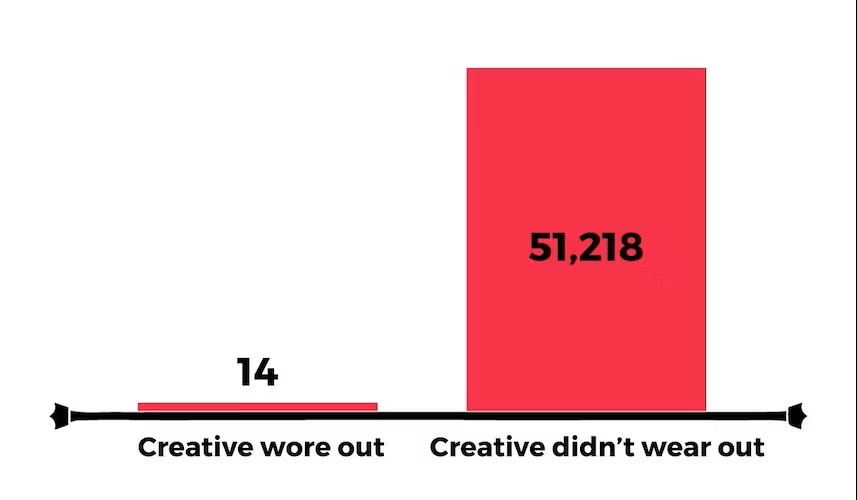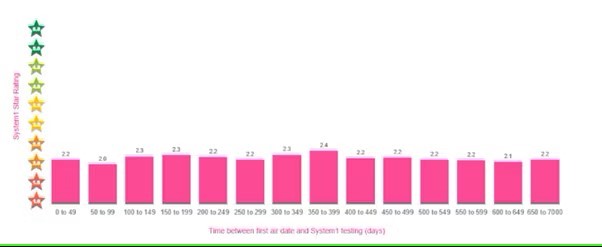
In looking back at this popular blog post when it was written this past February, I wonder why I didn’t include sales people in the headline. After all, they tend to be co-stars in the ongoing story about how consumers get fatigued over the music many stations present, day in and day out, year in and year out.
When it comes to burn-out, there’s typically a lot of finger-pointing going around. Rather than blaming the music as the source of most audience boredom, I’d be happy to explain to you that while the music is the usual scapegoat, it may be the station itself that’s the culprit.
When was the last time the production and positioning language was refreshed? Has the station van had a bath lately? And are we running the same promotions year after year after year?
Even in music research, the notion of fatigue and what’s behind it has always been a bit blurry. As the research often tries to tell us, station fans can love a song but become tired of hearing it (especially on the radio). Timing, as they say, is everything. – FJ
“Radio Listeners Don’t Get Tired Of Music, Only PDs and Music Directors Do”
February 21, 2024
Well, if that blog headline doesn’t get music radio’s attention, nothing will.
And it’s not meant for just practitioners of commercial radio’s music stations. It applies 100% to Christian radio and public radio stations that play music, including jazz, classical, Triple A, Americana, and yes, your urban alternative stations that have been springing up during the last five years.
So, where do I get off making this claim and why do I think I’m right?
First and foremost, some qualifications. Today’s blog post was inspired by an article that appeared in Marketing Week earlier this month, written not by a music programmer, a record company executive, a music researcher, or even a musician.
The author is Mark Ritson who holds a PhD in Marketing and has taught at business schools, including MIT. And full disclosure, the title of his column was:
“Consumers don’t get tired of ads, only marketers do”
I can tell you it’s one of the best marketing articles I’ve read in some time, largely because I agree with almost all of it, and it has a certain logic that should resonate with both marketers and radio programmers.

Now, you can tell me – and some of you most certainly will – that you cannot compare the wear and tear of an advertising campaign with that of a current (or classic) song. But after reading Ritson’s theories, I’m not sure why you can’t, at least to a degree.
Why does this matter? Because CMOs often walk away from an inherently effective campaign because they’re tired of it and because “Look how long we’ve been running it” paradigms.
Radio music directors and PDs aren’t all that different. It’s been said – and I think rightfully so – that people who work for stations listen to their own stations much more than normal people do (or that is healthy).
In ad world, Ritson calls it “wear-in,” the degree to which a campaign or ad has stayed too long at the party. In radio it’s “burn-out.” Same thing.
The more pragmatic among us may say, “But what about all that ad/music research we do? ”
ad/music research we do? ”
Isn’t that the great leveler? Isn’t there some sanity in all those Scantron sheets? After all, measuring “wear-in/burn-out” ought to provide the best metric for facilitating good decision-making.
Except that both research regimens are flawed. In the former, ad research teams often use college tests as their guinea pigs. Ritson shoots holes in both methodology and the idea that campaigns tend to follow the same cycles of exposure, repetition, and wear and tear. And of course, campaigns (er…songs) are going to hold up or fry at different rates.
Exposure may be the most important variable. Back in the pre-Internet days when yours truly last programmed, the only places consumers could hear a song was on a radio station or two, MTV (if it was newish), and on their own turntables and CD players.
Today’s cross-platform exposure – especially streaming because it is on-demand rather than linear – is a literal game-changer. And yet, radio is testing for so-called fatigue essentially the same way we did when Bob Pittman was a long-haired PD.
“And are you tired of it?” is no way to measure a song’s continued contribution to your playlist any more than learning the CHR down the dial just added the song you “broke” and have been banging into a hit.
But let’s look at the research – at least the ad stuff. Ritson points to research by Analytic Partners’ 2022 ROI Genome report as the first data point that indicates most marketers (I’ll let you fill in the radio analogy) have no idea what they’re doing.
They measured wear-out among 50,000+ ads and they learned this;
Most aren’t suffering from wear-out.
In fact, only 14 of the 51,000+ ads tested turned out to be fried. The rest? Still lots of tread on the tires.

And yet, most marketers are inclined to move on and create something new. Or in the words of the great philosopher Amplifi Media’s Steve Goldstein:
“It was working so well, we stopped doing it.”
In the radio world where audience research has become something of a rarity, there’s preciously even less data justifying dropping a song down to recurrent or putting it “on hold,” a limbo state where it will only enjoy millions of streams but won’t be heard on the radio.
As Ritson concludes, “The problem of wearout is one of the marketer, not the market.”
A little creative editing and we’re talking radio, songs, and bored programmers.
In another demonstration of research fallacies, Ritson turns to a study by System1 measuring the same ad and its ratings over time – when it first comes out and more than two years later:

That’s right – the scores are statistically the same over a relatively long period of time for a new ad campaign – or a new song.
Ritson ends his articles with several well-crafted “takeaways for marketers,” several of which don’t directly apply to the art of programming radio stations, picking and retaining songs.
But his first admonition – “Learn patience” – is spot on. Whether you’re a marketer or a designer handbag brand or you program a country station in Jacksonville, Florida, slowing things down and “learning the patience of the market” is key.
Ritson nods that we get too close to the product – in this case, the music. All that focus and passion can burn us out before the audience even remembers a song (or an ad) in the first place.
He also reminds “new marketers should resist new campaigns.” And to that, I wholeheartedly suggest stations whose position it is to play new music should still pump the brakes.
That’s not to say that if you’re a mainstream rock station and a new Foo Fighters lands on your credenza, you should sit on it and give it a think. But something new, bubbling under, unproven, streaming a good amount, and trying to break out deserves a degree of patience – especially to make sure you have enough rotational resources to adequately expose the playlist you submitted last week, much less a brand new song by an unknown artist.
Ritson also suggests “Looking backwards before you head forward.” Your gold library may hold more firepower than you think, especially these days when your audience will scarf down any comfort food you put in front of them.
 And finally, a piece of free advice from your friendly consultant (so you know what that’s worth): “You are not the center of the universe.”
And finally, a piece of free advice from your friendly consultant (so you know what that’s worth): “You are not the center of the universe.”
The only people who know you just added a song are you, your MD (maybe that’s also you), the label, and the trades. Listeners don’t treat your station like a “one stop shop” where they use you exclusively to hear what’s new and what’s next. In fact, you now may be one of the last stops on the new music express. All in all, another brick in the wall.
That’s OK. Know your place in the hierarchy, and program accordingly. You don’t have to be first in order to win, but you have to be great without getting too far out in front of the field.
- “My Favorite Decade Of Music Is The __’s” - June 5, 2025
- Who’s Got It Better? Talent In Commercial Radio vs. Talent in Christian Music Radio - June 4, 2025
- It’s The Christian (Radio) Thing To Do - June 3, 2025





Todd Storz said in 1956—“just when tue dj’s tire of a song, that’s when mama is starting to hum the verse”.
Truer words, my friend. Always great to hear from you. Happy holidays!
Play The Hits…..they Last!
Indeed they do!
excellent column, esp. learn the patience of the market.
The question I think we also need to ask is, if the quality is high, do listeners get tired of more variety? Can’t the tried & true exist on radio along with a greater variety that doesn’t send listeners reaching for deeper playlists elsewhere?
Should be required reading by – – EVERYONE in the “biz”. The “You are not the universe” slogan should be a required tattoo. After more than 50 years in “the business”- experience proves over and over again that “the hits” will work, no matter what the GM says. Want more “research”? Check with your local gaming establishment. We’re now 8 years into a weekly promotion that shows no sign of slowing down.
Agree with the premise. Case in point involve Boston, who’s eponymous debut still rotates in heavy classic rock rotation, and a lesson learned. A friendship began with a contest winner on CBS’ KRQR SF when I was mornings over 30 years ago. We sponsored NASCAR at Sonoma Raceway (with station logo on the fence) and had a rickshaw race between myself and Steven Seaweed, who was middays at the time. The winners of the VIP Day at the Races included two teams of them pulling us down the track. Big Al was part of my winning team. Been friends ever since. Fast forward to recent years. He was my plus one for The Doobie Brothers, Boston and Don Felder at Shoreline Amphitheater. You can imagine Tom Scholz played his greatest hits. The Boston CDs were being sold off a table, and Big Al bought the compilation. He was driving, so his CD player. He tore open the shrink wrap and put it on before we left the parking lot. Yes, it’s not burnt with listeners. I was Music Director at KSJO when the first album was released and still play it today as host off Lobster’s Sunday Brunch on 97.7 The River, Classic Rock for the North Bay. Doesn’t make my ears bleed. There’s a lot of Big Als out there.
Great thoughts in this piece. We stopped asking the “Tired of” Question back in the 80’s and just palyed the high scoring stuff until the numbers started going down.
Agree with you, Fred. as well as the rest of the commenters (and Lee Abrams said it best. with the succinctness of an imaging liner!).
What we have had to train ourselves to do is not overreact to hearing any given song as often as we do. After all, we are there for every play, whereas the average listener, tuned in for brief periods throughout the day, miss at least four out of every five spins.
And realistically, our imaging statements, if strong enough, shouldn’t “burn to a crisp” very quickly either.
Happy New Year, Fred.
And yeah, I know Lee was quoting Storz. It was still direct and to the point … and we all need to recognize when something is phrased “just right”.
Great article. I told students at a college station I advised that no one is listening as long or as closely as we would like to believe they are. That includes listening to jocks. I would guess it’s only radio geeks such as myself who turn UP the volume when the jock starts talking.
Caroline, that’s truly a radio pro habit that “civilians” don’t share. Thanks for the comment.
Amen! The rush to play the music first and the get to the next big thing is hurting radio. Tell my clients I am more afraid of getting off a song too early than getting on too soon.
Even with the limited ways to test “tired of” we have we don’s usually see that as an issue no matter how we ask the question.
And often, Scott, the labels conspired to get stations too move to that next single, even though its predecessor was still worthy of A-spins.